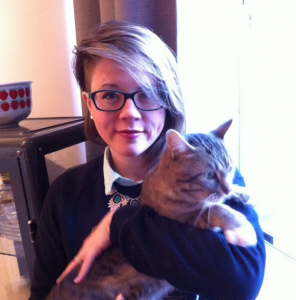
By Kristy Traux Nichols ’02
We argued as my father drove me home from the airport. It was winter break in 1999, and I tried to explain to him that I wanted to change majors, dropping business to pick up history instead. “But what will you do in real life?” he asked.
At the time, I had no answer. Other than historian or college professor, I couldn’t think of a single job a history degree would secure. Telling my father that I really hadn’t thought that far ahead wasn’t an option, so I shrugged and said, “Lots of people go into careers that are unrelated to their undergraduate degrees.”
I pursued my history degree with a passion, learning how to research and write papers, question sources and my own assumptions. A watershed moment occurred while writing my history senior seminar paper for Professor William Cohen. I sat in front of him, trying to explain why I wasn’t farther along. I had reams of research, but my thesis felt tenuous. He told me, “Don’t try and rearrange history to suit your thesis. Your thesis should grow from your research.” It seems obvious, but it can be difficult to see the bias creeping into your work.
My father’s question was prescient (for me at least), and in a twist of fate that I recognize as ironic, I graduated and went to work for a large investment bank. My background in research and writing set me apart, and I moved up the food chain. Today, I work at a Registered Investment Advisor as a financial analyst, and every day I use the skills I learned in the Hope College History department to read and judge the veracity of financial filings and management discussion. Every day I question the source of information and ask why assumptions are made. My history degree has proven invaluable, and I genuinely believe it has been the key to making my career.
However, a career is not a life, and the methodology learned while pursuing a history degree is not something that is easily compartmentalized. It shapes my understanding of the news I read and the politics I embrace. The United States is living through a contentious era right now, and I have been frustrated by the current state of political discourse. I see people on both sides of the aisle rush to embrace any news, true or not, that supports their political viewpoint. I want to take the opportunity to reflect on what Professor Cohen said to me. Don’t start with a belief and then find the news to support it. Allow the news to inform your beliefs. Use rigor in examining sources and bias, and base your arguments on data and fact, not emotion.
My father asked me what I’m going to do in real life. This is it. I’m going to chart the course of my life – public and private – by using what I’ve learned: Be curious. Research. Question. Apply.